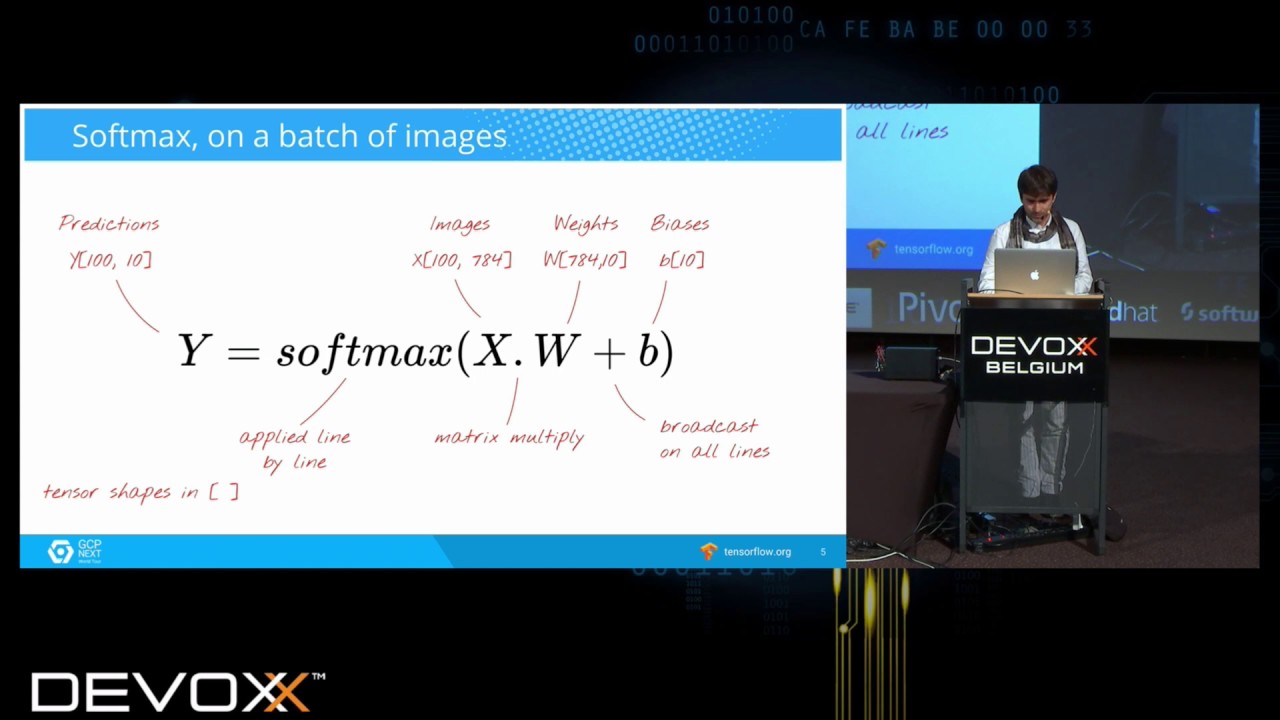Devoxx
Subscribe to Devoxx on YouTube @ https://bit.ly/devoxx-youtube
Like Devoxx on Facebook @ https://www.facebook.com/devoxxcom
Follow Devoxx on Twitter @ https://twitter.com/devoxx
Google has recently open-sourced its framework for machine learning and neural networks called Tensorflow. With this new tool, deep machine learning transitions from an area of research into mainstream software engineering. In this session, we will teach you how to choose the right neural network for your problem and how to make it behave. Familiarity with differential equations is no longer required. Instead, a couple of lines ofTensorflow Python, and a bag of “tricks of the trade” will do the job. No previous Python knowledge required.
This university session will cover the basics of deep learning, without any assumptions about the level of the participants. Machine learning beginners are welcome. We will cover: – fully connected neural networks – convolutional neural networks – regularisation techniques: dropout, learning rate decay, batch normalisation – recurrent neural networks – natural language analysis, word embeddings – transfer learning – image analysis – image generation – and many examples.
Martin Görner is passionate about science, technology, coding, algorithms and everything in between. He graduated from Mines Paris Tech, enjoyed his first engineering years in the computer architecture group of ST Microlectronics and then spent the next 11 years shaping the nascent eBook market, starting with the Mobipocket startup, which later became the software part of the Amazon Kindle and its mobile variants. He joined Google Developer Relations in 2011 and now focuses on parallel processing and machine learning.
[ULT-2698]
Source




59:00
The way he transitioned from Mnist to Convnets is Super Freaking cool. I wish i saw this before.
Thank you very much!
This is just an amazing lecture. Thank you!
Stanford videos are more in depth lol
Martin Gorner absolutely rocks. He has an incredible ability to make complex concepts easy to understand. Fantastic. Thanks, Martin!
The code for all the "Tensorflow without a PhD" sessions is now in a single place on GitHub: https://github.com/GoogleCloudPlatform/tensorflow-without-a-phd
The series now has 6 sessions. You will find the videos and slide decks at the URL above as well.
Dear martin, Thank you for your great video. Really comprehensive and it helped me to learn by example. It inspired me to replay your steps/approach and actually try it out myself (With the 2018 Keras/Tensorflow developments the "coding" is straight forward and intuitive). For other people who want to try out for themselves: https://www.kaggle.com/charel/learn-neural-networks-by-example-mnist-digits . Have fun!
听过了,类似的课,打基础挺不错的
Like like like like
A semester worth of lectures beautifully and comprehensibly super-packed into 3 hours.
Thank you 🙂
I am feeling really stupid. Well linear algebra and probability classes first I guess.
1:58:49, Women love french tongue, Oui-oui, c'est vrai
Where the lectures for explaining gradient computing can be found?
First time, I am really feeling good wrt ML.
How to get the code ??
ez as playing game
Not even half an hour in, great video. Made it very easy to understand
Real question, why do we use tf graphs if we can just use keras and build the model without the graph
whats the ide that he is using?
Thanks for free education
For those looking for souce code https://github.com/GoogleCloudPlatform/tensorflow-without-a-phd
One word. Keras.
THIS is the kind of videos we need: NO marketing buzzwords, just how it works with examples. One of the best videos I have ever seen on IT.
Martin ,I have to say this is a awesome video ,yeah, and I want the visualization code of training , that's petty cool ~ (its use tensorboard?)
Martin ,I have to say this is a awesome video ,yeah, and I want the visualization code of training , that's petty cool ~ (its use tensorboard?)
I just findi should learn english more. there is nothing to say for that.
good job ! thanks a lot , i can start learning tf now !
this is not for beginner
How I wish he was my deep learning professor!!! Please come to my university as an adjunct professor. I would take deep learning course again!
It is a hard topic. You understand the main idea but it takes some time to make sense of everything. This lecture is amazing. Great examples, everything is on point. Thank you!
2:28:30 love the acting
Now do it for 100 Billion Neurons…..lol
Great presentation. How do you make those slides with arrows and comments on the code and what not?
This just rises the level to PhD. It does the opposite it was uploaded for. Since you can't say you have experience anymore when mentioning Depp Learning since now it reveals anyone could just learn it on the internet.
Anyone has any idea how was he able to show the changing weights and accuracies in real time?